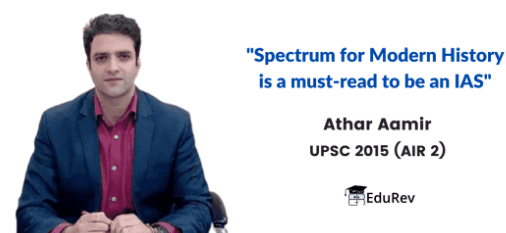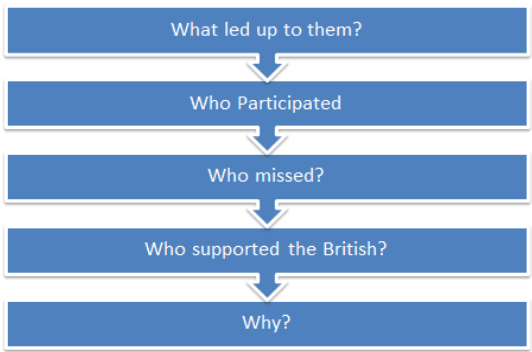How to Study Spectrum for Modern History for UPSC CSE PDF Download

On recommendations of IAS toppers like Anudeep Durishetty (AIR 1, 2017), Srushti Deshmukh (AIR 5, 2018), Junaid Ahmad (AIR 3, 2018), Akshat Jain (AIR 2, 2018), and a few others, EduRev Experts have compiled a strategy which will help you in reading the book Spectrum for Modern History in an efficient manner.

The Flow of events were happened in this way in Modern History:
You can divide all the chapters you will read in this way and remember it like a story.
Here is the strategy given for “sequence of reading chapters”:
- From Unit 3 you can start your preparation. You can straight away skip first two units, you can come back to them later if you have enough time.
- From Unit 3 to Unit 8 you have to study. These chapters are important as these cover core modern history.
- Start with the summary pages so that a framework will be formed in your mind, which will help you in understanding and engaging in the material more.
Unit 3: Rising Resentment Against Company Rule
- Chapter 6: People’s Resistance Against British Before 1857
- Chapter 7: The Revolt of 1857
Unit 4: Reform Movements
- Chapter 8: General Features of Socio-Religious Reform Movements
- Chapter 9: A General Survey of Socio-Cultural Reform Movements
In the entire book, there are so many movements given, so here is the strategy that how to analyse them.
How to Analyse Movements?

Unit 5: The Struggle Begins
- Chapter 10: Beginning of Modern Nationalism in India
- Chapter 11: The Foundation & the Moderate Phase of the INC
Unit 6: National Movement (1905-1918)
- Chapter 12: Era of Militant Nationalism (1905-1909)
- Chapter 13: First Phase of Revolutionary Activities (1907-1917)
- Chapter 14: First World War & Nationalist Response
Unit 7: Era of Mass Nationalism Begins (1919-1939)
- Chapter 15: The Emergence of Gandhi
- Chapter 16: Non-cooperation Movement & Khilafat Andolan
- Chapter 17: Emergence of Swarajists, Socialist Ideas, Revolutionary Activities & New Forces
- Chapter 18: Simon Commission & the Nehru Report
- Chapter 19: Civil Disobedience Movement & Round Table Conferences
- Chapter 20: Debates on the Future Strategy after the Civil Disobedience Movement
- Chapter 21: Congress Rule in Provinces
Unit 8: Towards Freedom and Partition (1939-1947)
- Chapter 22: Nationalist Response in the wake of World War II
- Chapter 23: Quit India movement, Demand for Pakistan and the INA
- Chapter 24: Post-War National Scenario
- Chapter 25: Independence With Partition
Unit 9 is most important. Because it is telling us about the aspects of the colonial rule governance like what were the changes introduced in the social context or in the administrative context. This whole unit is analytical hence it is most important unit.
Unit 9: India Under British Rule: Governance and Other Aspects
- Chapter 26: Constitutional, Administrative and Judicial Developments
- Chapter 27: Survey of British Policies in India
- Chapter 28: The Economic Impact of British Rule in India
- Chapter 29: Development Of Indian Press
- Chapter 30: Development of Education
- Chapter 31: Peasant Movements 1857-1947
- Chapter 32: The movement of the working class
Unit 10 just gives a read, as many questions are not asked in previous year from post independence.
Unit 10: Independence and After
- Chapter 33: Challenges Before the Newborn Nation
- Chapter 34: The Indian States
- Chapter 35: Making of the Constitution for India
- Chapter 36: Evolution of Nationalist Foreign Policy
- Chapter 37: First General Elections
- Chapter 38: Developments under Nehru's Leadership
- Chapter 39: After Nehru
What Can We Skip?
- Chapter 1 & Chapter 2 can be skipped as these are not asked in the exam.
- Unit 2: Chapter 3, 4, & 5 can also be skipped in the starting as very very few questions are asked from it. You can give them read later.
- How is history of modern India be constructed? (this includes Chapter 1-2). This you should only know if you have history as optional, if not, you need not to learn it deeply just giving a good read is enough.
- In Unit 2, Chapter 3 is not that important as it is only telling that who went where from 1600, just give a read.
- In the unit 2, chapter 5 is important, because this deals with some important analytical questions like Why were the British successful?
















